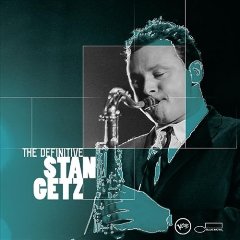Stan Getz - The Definitive Stan Getz (2002)
Stan Getz - The Definitive Stan Getz (2002)

1 Early Autumn 3:10 Double Bass – Chubby Jackson Drums – Don Lamond Piano – Lou Levy Saxophone [Tenor] – Zoot Sims Trombone [Bass] – Bob Swift 2 Parker 51 6:06 Double Bass – Teddy Kotick Drums – Tiny Kahn Guitar – Jimmy Raney Piano – Al Haig 3 Moonlight In Vermont 3:13 Double Bass – Eddie Safranski Drums – Don Lamond Guitar – Johnny Smith Piano – Sanford Gold 4 East Of The Sun (And West Of The Moon) 6:17 Double Bass – Leroy Vinnegar Drums – Shelly Manne Piano – Lou Levy Trumpet – Conte Candoli 5 Tour's End 4:54 Double Bass – Ray Brown Guitar – Herb Ellis Piano – Oscar Peterson 6 Once Upon A Time 4:46 Cello – Bruce Rogers Drums – Eddie Sauter Violin – Norman Carr 7 Desafinado 4:11 Double Bass – Tommy Williams Drums – Milton Banana Guitar – João Gilberto Piano – Antonio Carlos Jobim Vocals – João Gilberto 8 The Girl From Ipanema 5:21 Double Bass – Tommy Williams Drums – Milton Banana Guitar – João Gilberto Piano – Antonio Carlos Jobim Vocals – Astrud Gilberto, João Gilberto 9 Summertime 6:58 Double Bass – Gene Cherico Drums – Joe Hunt Vibraphone – Gary Burton 10 Litha 8:27 Double Bass – Ron Carter Drums – Grady Tate Piano – Chick Corea 11 Blood Count 4:01 Double Bass – Rufus Reid Drums – Victor Lewis Piano – Kenny Barron 12 Night And Day Piano – Kenny Barron Stan Getz – tenor saxophone Arranged By – Ralph Burns (tracks: 1) Conductor – Hershy Kay (tracks: 6)
The Definitive Stan Getz winds its way through the major periods of the legendary tenor saxophonist, starting with his tenure in Woody Herman & the Second Herd in 1948, through '50s cool jazz dates recorded for the Roost label, mid-'60s bossa nova experiments with João Gilberto, his nod toward a harder sound in the '70s propelled by a rhythm section of Chick Corea, Ron Carter, and Grady Tate, and his final recordings in the late '80s/early '90s with pianist Kenny Barron. While The Definitive Stan Getz doesn't come close to presenting a complete overview of his career, it does an excellent job at scratching the surface. ---Al Campbell, Rovi
Woody Herman always led exciting bands and used many of the finest musicians of the day - one of his best was formed in 1948. In the saxophone section was twenty-one year old Stan Getz who eventually would be acclaimed as one of the 'jazz elite' by his peers and jazz fans throughout the world. Although by then he had already played with Jack Teagarden and Stan Kenton, there is one particular track on the LP 'Keeper of the Flame' recorded by Woody in 1948 that brought the name Getz to the fore as a tenor player with an exceptional tone and someone who could interpret a melody. When the record was released 'Early Autumn' featuring the seductive and expressive tenor sound of Getz was an immediate hit - his career had taken off. His future playing predominantly concentrated on playing with small groups many of which he led himself. When 'Parker 51' was released he was well established and besides his unique sound he was developing his phrasing and technique - both of which he worked on throughout his career.
By the time 'Tour's End,' a Getz composition, was recorded he was building up complex phrases and repeating or extending them with a flourish of notes. His runs were often over several bars, or alternatively, he relied on a minimum of notes to put across an idea at the same time swinging like mad. He couldn't have been in better company than here with the Oscar Peterson Trio. He was a master of the ballad and 'Moonlight In Vermont' reflects exactly what alerted people to him in the first place. Included as Tracks 7 & 8 are part of his excursions into the music of Brazil and especially that of Antonio Carlos Jobim. 'Desafinado' and 'The Girl From Ipanema' were 'smash hits' both of which some forty years later still have immense appeal.
Eddie Sauter's 'Once Upon A Time' is part of the seven-part suite for saxophone written after a request by Getz. It takes a brave man to tackle this kind of material but Getz takes it in his stride displaying all the facets of his experience.
If one was only familiar with his earlier recordings it would be easy to wonder how he could progress further, but progress he did and we are fortunate to have many recordings made throughout his career building up to the last and, in the opinion of many, finest years. The climax is evident on 'Night and Day' that is taken from the CD set 'People Time.' It was recorded three months prior to Getz's death and features only one other musician, pianist Kenny Barron. The feeling and understanding between these two jazz masters is amazing. ---Jack Ashby, musicweb-international.com
download (mp3 @320 kbs):
yandex 4shared mega mediafire cloudmailru uplea








